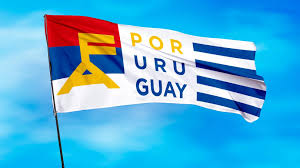
By Roberto Morejón
Neither the passion of the Copa América nor the low temperatures of the southern winter take the campaign leading up to the elections on October 27 out of the public spotlight in Uruguay.
In just a break from the soccer tournament, Uruguay held primary elections on June 30th, when the presidential candidates of the different parties were selected, with participation less than that of 2019.
Yamandú Orsi, from the Frente Amplio, Álvaro Delgado, from the National or Blanco Party, and Andrés Ojeda, from the Colorado Party, emerge as the main candidates.
In elections that were open, simultaneous and mandatory for the parties, the Frente Amplio, the main opposition force, decided to grant favoritism to Orsi, mayor of the department of Canelones, and Carolina Cosse, mayor of Montevideo, as running mate.
Orsi, considered a repository of the trust of former president and leader José Pepe Mujica, projects himself as a defender of the construction of a just country and raises the motto “unite to integrate.”
Cosse is confident that the Frente Amplio “began to return,” in reference to the return to the presidency of the nation, in which she spent 15 years.
On the opposite side emerges the National Party, whose elected suitor was Álvaro Delgado, heir to the right-wing Luis Lacalle Pou.
The National Party has the challenge of keeping the coalition with which it has governed united, not without tension, in the face of concessions in public policies to satisfy the demands of the conservatives.
Also participating in the race, among others, are the traditional Colorado Party, with Andrés Ojeda, and the far-right Cabildo Abierto.
Despite the range of options, many Uruguayans express boredom with party management and are apathetic about calls to the polls and certain political figures.
However, Uruguayans reflect on how they will vote on October 27 amid evidence of structural poverty and an increase in the number of young people and adolescents in that condition.
Along with this, the South American country began to feel the effects of drug trafficking, crime and violence.
Many people attribute much of the responsibility for the aforementioned problems to Lacalle Pou, in addition to the deficiencies of the social safety net.
It is not surprising then that polls highlight the decline in support for the ruling coalition in Uruguay, although analysts predict that the October elections will be tight.

